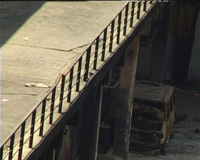medial 1. art biennial
[2005]
|
1.
Edipus2,
cg
/ multimedia,
US$ 1200.
2.
image2.,
cg
/ multimedia,
US$ 1200.
3.
image3.,
cg
/ multimedia,
US$ 1200 |
The Rational of the work
the main theme refers to disaster, in a family, and public places.
Each of the 4 actors is making a citation in Hebrew of these fraises below
from the drama, Oedipus Rex. The text represents the soon and his aggressive
relationships towards his parents. The question that is raise here is about
the identity of the soon in a matter of belonging, the story is telling by 4
people that tells the same facts, in order to reinforce the meaning of the
drama.
This work 'Oedipus Rex' is a video, audio piece, projected on a large screen
simultaneously with another projection 'Ruins' on the other side of the same
screen, which presents a very detailed destruction of a building. When one
is specking the other Characters are in hold, or all of them are speaking
together, there are several simultaneous actions between them, using the
image and the sound in a different ways.
I'm enclosing a translation of the passage from Oedipus Rex:
the passage is in episode 3, lines 771-815;
[Oedipus} it will not be kept from you, now that my forebodings have
advanced so far. To whom more than to you would I speak in suffering such a
fortune as this? my father was Polybus of Corinth, [775] my mother the
Dorian Merope. I was considered the greatest of the folk in that town, until
a chance event befell me, worthy, indeed, of wonder, though not of my
overreaction regarding it. At a banquet, a man drunk with wine [780] cast it
at me that I was not the true son of my father. And I, vexed, restrained
myself for that day as best as I could, but on the next went to my mother
and father and questioned them. They were angry at the one who had let this
taunt fly.
[785] So I had comfort about them, but the matter rankled in my heart, for
such a rumor still spread widely. I went to Delphi without my parents'
knowledge, and Phoebus sent me forth disappointed of the knowledge for which
I had come, [790] but in his response set forth other things, full of sorrow
and terror and woe: that I was fated to defile my mother's bed, that I would
reveal to men a brood which they could not endure to behold, and that I
would slay the father that sired me. When I heard this, I turned in flight
from the land of Corinth, [795] from then on thinking of it only by its
position under the stars, to some spot where I should never see fulfillment
of the infamies foretold in my evil fate. And on my way I came to the land
in which you say that this prince perished.
[800] Now, lady, I will tell you the truth. When on
my journey I was near those three roads, there I met a herald, and a man in
a carriage drawn by colts, as you have described. The leader and the old man
[805] himself tried to thrust me rudely from the path. Then, in anger, I
struck the one pushing me aside, the driver, and the old man, when he saw
this, watched for the moment I was passing, and from his carriage, brought
his double goad straight down on my head. [810] Yet he was paid back with
interest: with one swift blow from the staff in this hand he rolled right
out of the carriage onto his back. I slew every one of them.
The translation is from: Sophocles.
The Oedipus Tyrannus of
Sophocles. Edited with introduction and notes by Sir Richard Jebb. Sir
Richard Jebb. Cambridge. Cambridge University Press. 1887



